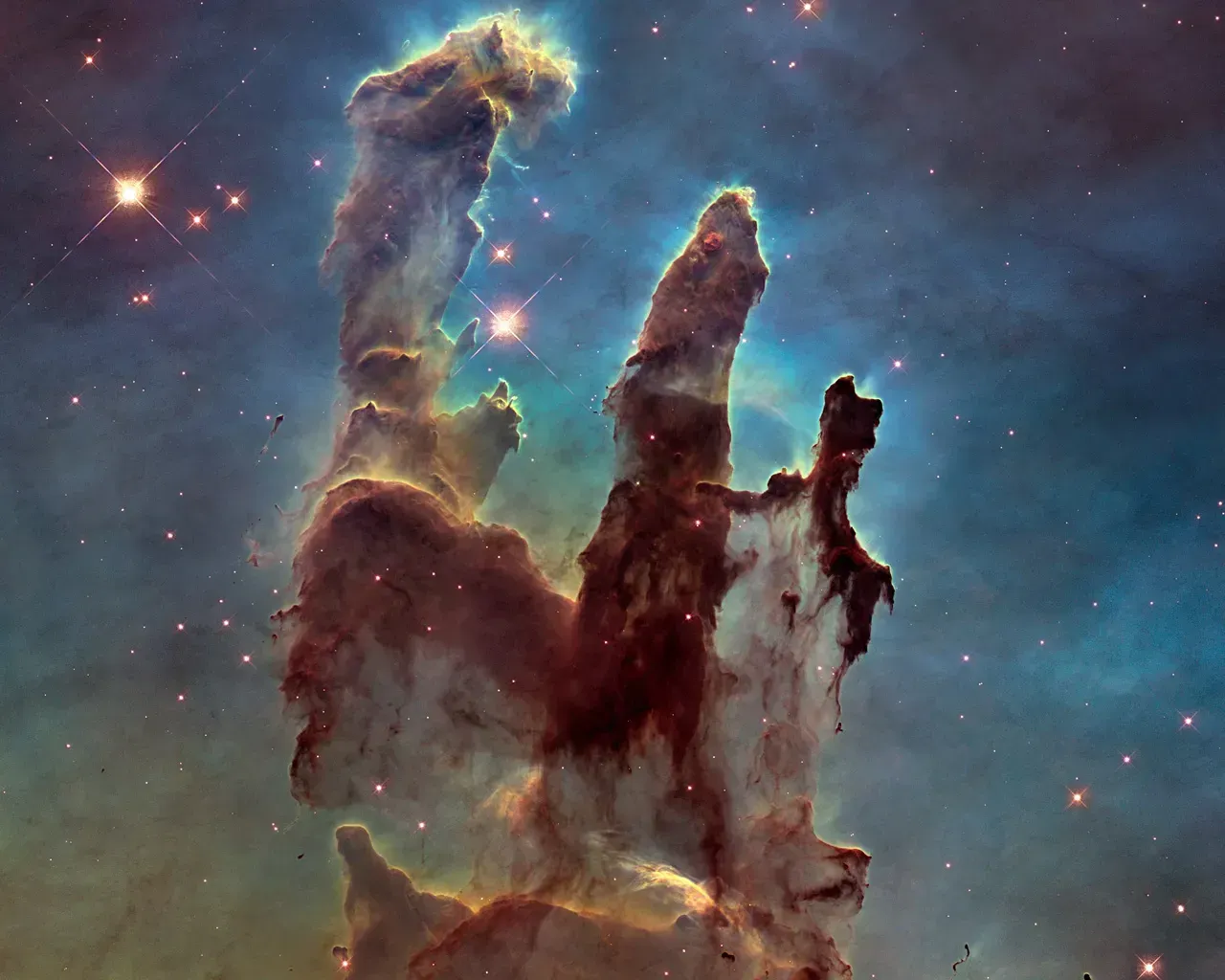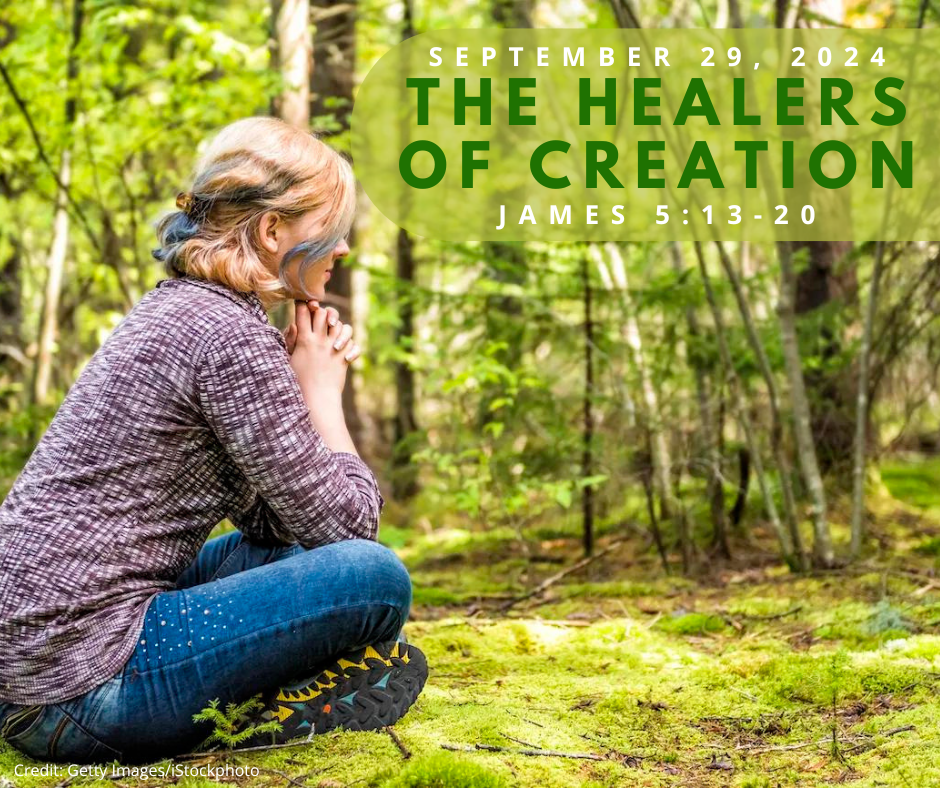What is the point of praying, in the wake of Hurricane Helene?

Pillars of Creation Nebula from the Hubbell Telescope
Is anyone among you in trouble? Let them pray. Is anyone happy? Let them sing songs of praise. 14 Is anyone among you sick? Let them call the elders of the church to pray over them and anoint them with oil in the name of the Lord. 15 And the prayer offered in faith will make the sick person well; the Lord will raise them up. If they have sinned, they will be forgiven.16 Therefore confess your sins to each other and pray for each other so that you may be healed. The prayer of a righteous person is powerful and effective.
James 5:13-16
Does it matter to pray for the planet and about climate change? Will we have any effect on rising sea levels, scorching summers, or more intense weather disasters? Or is prayer a personal practice that helps us navigate daily life? People often ask me to pray for good weather for an outdoor wedding, and I often quip, "I'm in personnel, not management." Some problems of the universe are above my pay grade! But our Sunday prayers usually include many things far beyond our control.
These thoughts lead to more profound theological questions, like if prayer works and, if so, how. Does praying for peace in the Middle East or easing world hunger matter? Sending our thoughts and prayers after school shootings has become a ridiculed cliché since we have had 28 school shootings this year. Should we pray about the planetary-sized problems or stay in our lane with the challenges and sufferings of daily life?
Curiosity led me to read the latest from the Pew Research Foundation. It notes that 65 percent of Christians think prayer is an integral part of faith, 55 percent report praying daily, and 45 percent believe they have answered prayer in the past year. About 25 percent pray for broader issues of society like poverty or world peace. What do we make of this declining staircase of prayer statistics? I'm surprised only 65 percent of Christians see prayer as necessary, which means one in three do not see its value. It doesn't surprise me that just over half pray daily; that seems high, given how busy life can be. I admire the 10 percent who pray daily but don't think they have had any answers to prayer in the past year. That is a faith commitment! My takeaway is that while the average Christian prays, we are nearly 50-50 on whether prayer is worth our time and if it accomplishes what we hope. And since only one in four pray for more encompassing issues, I wonder if it means we don't think prayer will make any difference on the world stage other than just making us better individuals.
I will make the case that prayer significantly impacts our faith development. Taking time to connect with the divine improves our well-being, guides us to wisdom and courage, and helps us understand and connect to even the intractable world problems. Also, relating to climate change, I will make the case that integrating creation into our spirituality is essential to addressing our climate challenges. A more creation-oriented spirituality provides a new path to faith for a more secular generation.
In our scripture reading from the book of James, the author concludes his brief epistle by urging people to pray in various situations. If you are in trouble, pray. If you are happy, sing praises. Pray for people who are sick, bringing the elders of the church together. Confess your sin so you can move forward and change. James shows us that prayer includes a rich diversity of practices in different life situations. Prayer is not just asking for things; it also involves seeking wisdom and strength in times of trouble, gratitude for good things, reflection on where we fall short, and seeking good things for others, including healing. This list is a great beginning but not exhaustive of the possibilities. The influence of Buddhism has led to more people practicing mindfulness, a prayer of learning to be silent and present right where we are.
James also notes the importance of praying together, not just alone. If someone is sick, we need all the elders to come in. Praying together reminds us that we are not alone in stumbling toward God but are upheld by a community. The Lord's Prayer is meant to be done together. We pray to "our Father," not just our personal God. We pray for a kingdom to come, a new and more just order for things, not just for our salvation and well-being. Give us this day, our daily bread, which means every human deserves food security.
We discussed this in Bible study on Monday, and several people who have gone through significant illness addressed the value of prayer support as essential to their well-being. Becky Welsh said the prayers of this congregation saved her life. This discussion raised an important issue. What do we mean when we say prayer "works" or is "answered?" Efforts at research into prayer have established that people who pray are often happier, healthier, and more caring and involved in the community. But not everyone. I know people who pray daily who are miserable, narrow-minded, and judgmental. I also know people who are kind and generous, and yet they die of cancer despite many prayers. Prayer does not have a simple formula for results; if you pray the right way, say the right words, and do it often enough, you will get the desired result. Prayer is not God's way of taking opinion polls. God does not stand over us like an emperor at the coliseum, waiting to deliver a thumbs up or down based on the number of prayers. Nor does God have complicated rules like the Senate and filibusters us on healing or world peace until we can get 60 percent of us to pray the same way.
We pray together because prayer is a way of relating. Prayer guides how we relate to life, God, the Universe, each other, and ourselves. It does not produce a commodity but rather strengthens our relatedness. Prayer is more about aligning than getting what we want. It is more like piano tuning than getting compound interest in our bank account.
James shows us the way to a rich and diverse prayer life, where we match different prayer forms with varying life circumstances. The Psalms of the Old Testament also teach the importance of varieties of prayer in multiple circumstances. There is a Psalm for everything, including the harvest, laments for things gone awry, appeals for justice in the world, asking for forgiveness or healing, looking for God's presence, and even a few curses for enemies. I asked ChatGPT what percentage of Psalms are about broader social issues, and this is the answer I got:
Approximately 40% of the psalms are classified as laments or psalms that call for justice and address societal issues. These psalms frequently express deep cries for God's intervention in the face of injustice, oppression, and suffering. Many focus on the plight of the vulnerable, including the poor, orphans, and widows, emphasizing God's concern for justice.
The prayers of the ancient Psalms encourage us to pray about the big picture. Specifically, Psalms urges us to lament when devastation strikes us. Lament is not a significant prayer form in our culture, but perhaps we need it more than ever. A lament voices our emotional pain, anguish, and grief. Our culture tends to bury strong negative emotions. We cover death with flowers rather than throw a handful of dirt into a grave. Grief is often buried and not spoken. Many people who are grieving a death have told me that they feel like they have the plague and people are awkward around them. Lament helps us give voice to grief. Lamenting together means we are not alone. Prayer can't reach back and change the past, but it can bring us closer to God and one another. It stimulates the healing of our souls.
We also feel grief about what is happening in the world. Whether the devastation is from war in the Middle East or Hurricane Helene pounding the Southeast this week, it burdens our hearts. The church has a necessary and powerful role to play amid all kinds of grief by showing our solidarity and care. This care is a step towards healing, hope and action. (Not just thoughts and prayers.) Climate grief is now a new psychological diagnosis, especially causing emotional distress for younger generations. Many wonder if they have a future, and some are deciding not to have children. This situation looks like an opportunity for ministry to distressed people. We might do well to remember the generation gap in climate change. Seventy percent of people in Gen X to Gen Z consider dealing with climate change a top priority, while only 58 percent of Boomers identify the same priority. If you are worried about not seeing younger generations in church, perhaps we need to get more in touch with their priorities.
I'm wondering if a creation-oriented spirituality can play a role in the renewal of the church, not just because of climate change but because of technology and the increasing secularization of society. Connecting with creation is a pathway to wonder and awe. Awe is an antidote to grief and hopelessness.
Robert B. Hubbell, a political commentator I read on Substack, is also an amateur astronomer. He concludes his columns with a daily dose of perspective with pictures of brilliant star systems and far-flung nebulas. Historian Heather Cox Richardson also provides a weekly picture of sunrises, sharing our beauty with her readers. These writers understand how much we need awe and wonder. We need to live out of a bigger perspective. Wonder stirs love. And we only create change when we truly love.





